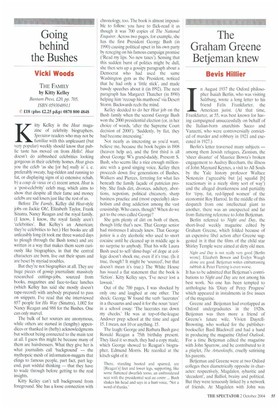Going behind the Bushes
Vicki Woods
THE FAMILY by Kitty Kelley Bantam Press, £20, pp. 705, ISBN 0593048911 © £18 (plus £2.25 p&p) 0870 800 4848 Kitty Kelley is the Heat magazine of celebrity biographers. Spectator readers who may not be familiar with this unpleasant (but very popular) weekly should know that public taste has moved on from Hello!. Heat doesn't do airbrushed celebrities looking gorgeous in their celebrity homes. Heat gives you the celeb `as she [or he] rea16, is' i, e. preferably sweaty, hag-ridden and running to fat, or displaying signs of a) extensive rehab, b) a coup de vieux or c) recent arrest. Heat is a 'post-celebrity' celeb mag, which aims to show that despite all their fame and money celebs are sad losers just like the rest of us.
Before The Family, Kelley did Heat-style jobs on Jackie Ohl. Elizabeth Taylor, Frank Sinatra. Nancy Reagan and the royal family. (I know, I know, the royal family aren't `celebrities'. But Kelley's an American: they're celebrities to her.) Her books are all unfeasibly long (it took me three wasted days to plough through the Bush tome) and are written in a way that makes them seem curiously like biographies, in that the central characters are born, live out their spans and are beset by myriad troubles.
But they're not biographies at all. They are huge pieces of gossip journalism: massively researched cuttings-jobs, sourced from books, magazines and face-to-face lunches (which Kelley has said she mostly doesn't tape-record) with anybody prepared to pass on snippets. I've read that she interviewed 857 people for His Way (Sinatra), 1.002 for Nancy Reagan and 988 for the Bushes. One can only marvel.
The bulk of her sources are anonymous, while others are named in (lengthy) appendices or thanked in (hefty) acknowledgments but without being connected to the main text at all. I guess this might be because many of them are hairdressers. What they give her is what journalists call `background' — the mythopeic mesh of information-nuggets that clings to famous people, part fact, part legend, part wishful thinking — that they have to wade through before getting to the real insights.
Kitty Kelley can't tell background from foreground. She has a loose connection with chronology, too. The book is almost impossible to follow: you have to flick-read it as though it was 700 copies of The National Enquirer. Across two pages, for example, she has the first President George Bush (in 1990) causing political upset in his own party by reneging on his famous campaign promise (`Read my lips. No new taxes'). Sensing that this sudden burst of politics might be dull, she then sets up a gossipy paragraph about a Democrat who had used the same Washington gym as the President, noticed that he had only a 'little stick', and made bawdy speeches about it (in 1992). The next paragraph has Margaret Thatcher (in 1990) helping him 'recoup his manhood' via Desert Storm. Backwards reels the mind.
Kelley decided to do her Heat job on the Bush family when the second George Bush won the 2000 presidential election (or, in her choice of words. 'after the Supreme Court decision of 2000'). `Suddenly, by fiat, they had become interesting.'
Not nearly as interesting as you'd want, believe me, because the book begins in 1908 (heaven help us), and the first third is all about George W's grand-daddy, Prescott S. Bush, who seems like a nice enough millionaire with a good singing voice. Kelley then proceeds down five generations of Bushes, Walkers and Pierces, ferreting for what lies beneath the family facade of patrician probity. She finds dirt, divorces. adultery, abortions, nepotism, political chicanery, sharp business practice and (most especially) alcoholism and drug addiction among the vast cousinship. Who cares. though? When do we get to the ones called George?
She gets plenty of dirt on both of them, though little that's new. That George senior had mistresses I already knew. That George junior is a dry alcoholic who used to snort cocaine until he cleaned up in middle age is no surprise to anybody. That his wife Laura Bush used to sell `dime-bags' of dope at college doesn't shock me, even if it's true. (Is it true, though? It might be 'sourced', but that doesn't mean it's true.) The White House has issued a flat statement that the book is `fiction'. Kitty Kelley says. 'I've never lost a lawsuit.'
Out of the 700 pages, I was shocked by only one and laughed at one other. The shock: George W found the verb 'lacerates' in a thesaurus and used it for the noun 'tears' in a school essay: 'The lacerates ran down my cheeks.' He was at top-of-the-league Andover prep school at the time and aged 15. I mean, not 10 or anything. 15.
The laugh: George and Barbara Bush gave Ronald Reagan a 75th birthday present. They liked it so much, they had a copy made, which George showed to Reagan's biographer, Edmund Morris. He recoiled at the kitsch sight of it:
There, standing booted and spurred, are [Reagan's] feet and lower legs, supporting, like some flattened dwarfish torso, an embroidered seat with the presidential seal an centre Bush shakes his head and says in a hurt voice, 'Not a word of thanks.'


















































































 Previous page
Previous page